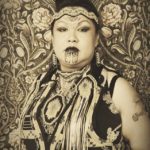 Morning Star (Nicole Eshkakogan) is Anishnawbe/Blackfoot from Sagamok AnishnawbekFirstNation, Ontario, and the Piikani Nation of the Blackfoot Confederacy in Southern Alberta. I am completing my Ph.D. in Sociology at the University of Alberta studying the experiences of indigenous grandmothers providing care for children of MMWIG.
Morning Star (Nicole Eshkakogan) is Anishnawbe/Blackfoot from Sagamok AnishnawbekFirstNation, Ontario, and the Piikani Nation of the Blackfoot Confederacy in Southern Alberta. I am completing my Ph.D. in Sociology at the University of Alberta studying the experiences of indigenous grandmothers providing care for children of MMWIG.
Category: Oral Presentations
Olivia Franks, Queens University
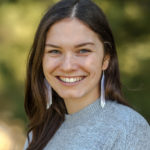
Olivia Franks is a Kanien’kehá:ka student from Wahta Mohawk Territory. She grew up in Wahtawith her parents and sisters until moving to Kingston, Ontario to attend Queen’s University. Sheis currently working on her Master’s degree studying health promotion, under the supervision of Dr. Lucie Lévesque. Her research is in partnership with the Kahnawà:ke Schools Diabetes Prevention Project, which utilizes community-based participatory research to mobilize indigenous communities across Canada for type 2 diabetes prevention and healthy living. Through her research, she hopes to contribute to knowledge translation interventions created by, with, and for Indigenous communities. Olivia’s career goals are to undertake Indigenouscommunity-owned and participatory research that may inform public policy to support community needs and foster research sovereignty for Indigenous Nations.
See Olivia’s presentation, Engaging with Indigenous Research on Friday, August 14th at 11 am PST/ 3:00 pm ADT.
Robline Davey, Simon Fraser University
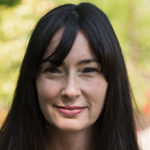 Robline Davey (Robbi) has recently completed a Master of Education at Thompson Rivers University (TRU) and beginning a doctoral program at SFU in Educational Technology in Fall 2020. Robbi’s research interests include exploring the way distance learning and the digital spaces can provide increased access to post-secondary education for Indigenous students. A media specialist in online education, she plans to integrate design thinking and her recent experience as an online student, to bring an interdisciplinary and holistic approach to her research. Other research interests include revitalizing traditional food and technology, as a way to bolster Indigenous health and well-being. Recently, Robbi worked on successful interdisciplinary community-driven CIHR and SSHRC grant applications. Robbi is the mother of a 9-year old boy and currently works in the Career and Experiential Learning Department as the Indigenous Experiential Learning Coordinator.
Robline Davey (Robbi) has recently completed a Master of Education at Thompson Rivers University (TRU) and beginning a doctoral program at SFU in Educational Technology in Fall 2020. Robbi’s research interests include exploring the way distance learning and the digital spaces can provide increased access to post-secondary education for Indigenous students. A media specialist in online education, she plans to integrate design thinking and her recent experience as an online student, to bring an interdisciplinary and holistic approach to her research. Other research interests include revitalizing traditional food and technology, as a way to bolster Indigenous health and well-being. Recently, Robbi worked on successful interdisciplinary community-driven CIHR and SSHRC grant applications. Robbi is the mother of a 9-year old boy and currently works in the Career and Experiential Learning Department as the Indigenous Experiential Learning Coordinator.
See Robbi’s presentation on Wednesday, August 12th at 11:00 am PST/ 3:00 pm ADT.
Shelley Wiart, Athabasca University
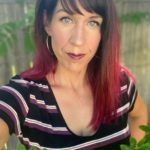
Shelley Wiartis a member of the North Slave Métis Alliance, Yellowknife, Northwest Territories. Shelley is currently finishing her fourth year of a Bachelor of Arts program in the faculty of Humanities & Social Sciences, Athabasca University. She is the co-founder of an Indigenous-focused holistic health program, Women Warriors. Last summer she was the recipient of the Hotıì ts’eeda (NWT SPOR Support Unit) Research CapacityDevelopment Program and the Alberta Indigenous Mentorship in Health Innovation (AIM-HI) Undergrad Summer StudentStipend for her Indigenous women’s health research project, Digital Storytelling as an Indigenous Women’s Health Advocacy Tool: Empowering Indigenous Women to FrameTheir Health Stories. She published an academic article from this research, Decolonizing Health Care: Indigenous Digital Storytelling as a Pedagogical Tool for Cultural Safety in Health Care Settings in Northern Public Affairs Magazine 2020. Shelley is an avid writer and was awarded the Sally Manning Award for Indigenous Creative Non-Fiction (2020) in Up Here magazine. She has also earned a spot as part of Governor General’s Canadian Leadership Conference. Shelley’s current research through AIM-HI is an extension of her digital storytelling project and explores how this Indigenous health research has shaped the participant’s health stories and the significance of including research participants in Indigenous knowledge translation.
See Shelley’s presentation, The Methodology of Indigenous Digital Storytelling: A Healing Journey in Data Collection on Thursday, August 13th at 10 am PST/ 2:00 pm ADT.
Stephanie Sinclair, University of Manitoba
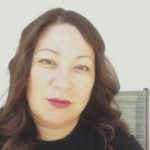 Stephanie Sinclair
Stephanie Sinclair
I am an Anishinaabe mother of two, a daughter of an IRS survivor and a community-based researcher. I am currently completing a Ph.D. in Native Studies at the University of Manitoba and have a Masters in Clinical Psychology. I work for a regional organization, the First Nation Health, and Social Secretariat of Manitoba as a research coordinator and have worked in various areas of the last 13 years.
See Stephanie’s presentation, Restoring First Nations Birth Knowledge and Practice, and the Impact on Women’s Mental Wellness on Thursday, August 13th at 11 am PST/ 3 pm ADT.
Taylor Morriseau, University of Manitoba
 Taylor Morriseauis a member of Peguis First Nation and a CIHR Vanier Scholar examining early-onset type 2 diabetes among Indigenous youth in Manitoba. She currently serves on the Chief Science Advisor’s Youth Council and was recognized by WXN as a recipient of Canada’s Most Powerful Women Top 100 award.
Taylor Morriseauis a member of Peguis First Nation and a CIHR Vanier Scholar examining early-onset type 2 diabetes among Indigenous youth in Manitoba. She currently serves on the Chief Science Advisor’s Youth Council and was recognized by WXN as a recipient of Canada’s Most Powerful Women Top 100 award.
See Taylor’s presentation, New Insights into Gene-diet Interactions in Early-onset Type 2 Diabetes on Wednesday, August 12th, 10:00 am PST/ 2:00 pm ADT
Zoey Verlaan, University of Victoria
 Zoe Verlaan
Zoe Verlaan
My name is Zoe Verlaan and I am a Nlaka’pamux woman from the Spuzzum First Nation and grew up in the Secwepemc territory of the Splatsin First Nation (Enderby). Currently, I am a visitor to the territories of the Lekwungen-speaking peoples of the Songhees, Esquimalt, and WSANEC First Nations (Victoria).
